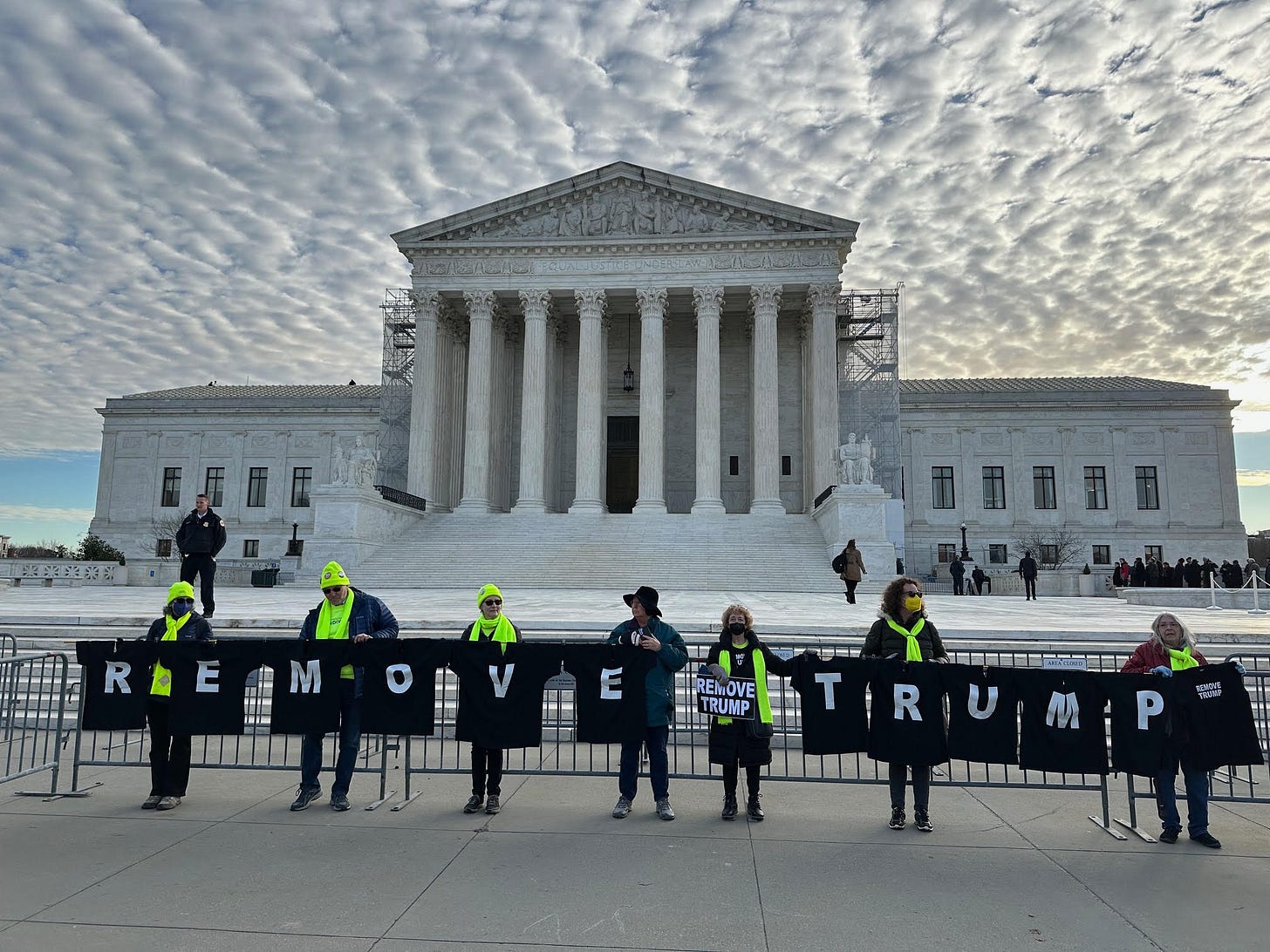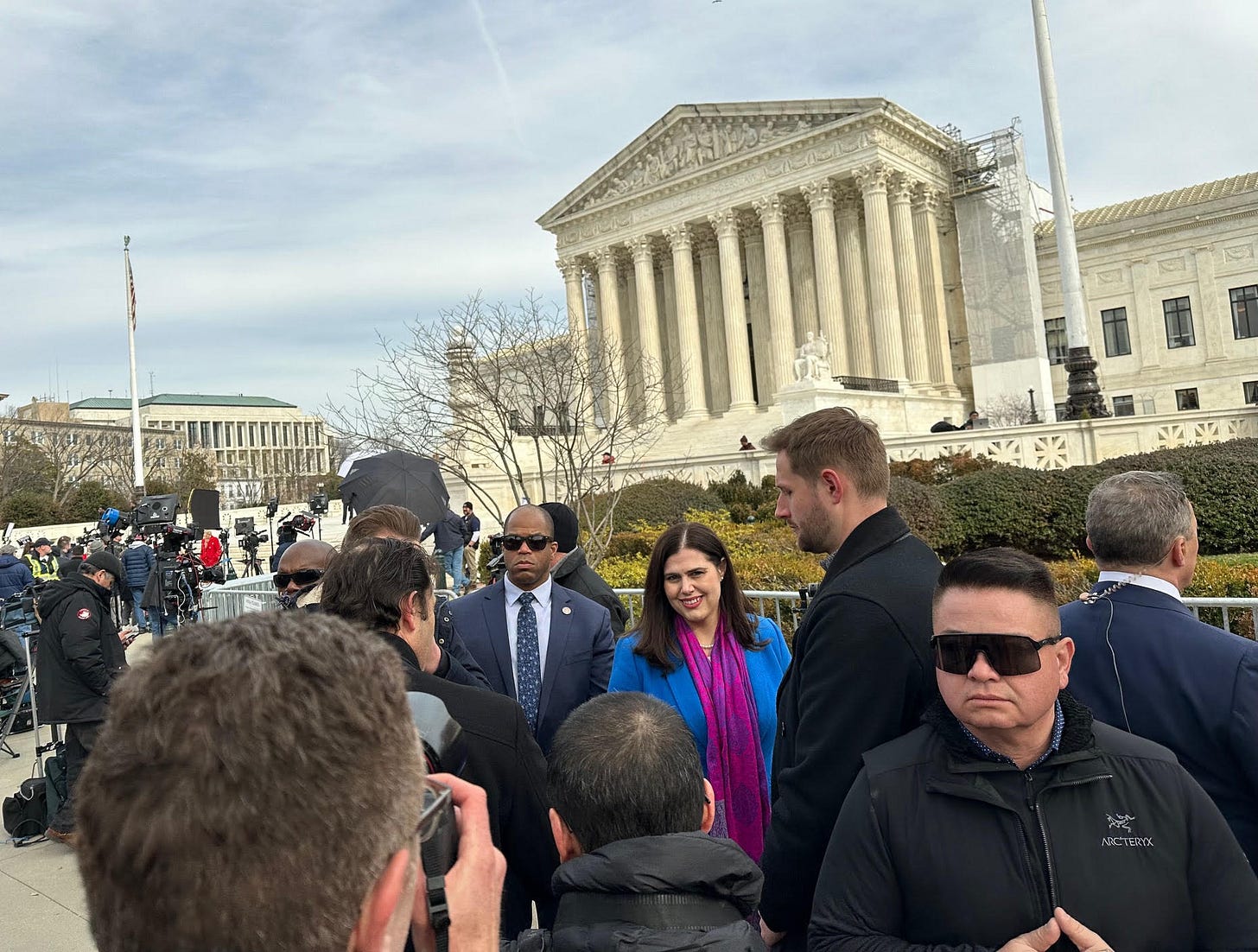Supreme Court almost certain to allow Trump to remain on Colorado's primary ballot
The justices appeared to be more concerned about what removing Trump from the ballot would do rather than whether the Constitution says he is disqualified.

After a little more than two hours of arguments Thursday, the U.S. Supreme Court appeared all but certain to rule that, at least under current federal law, Donald Trump can appear on Colorado’s Republican presidential primary ballot, reversing the Colorado Supreme Court’s decision to the contrary.
In December, the Colorado Supreme Court decided that Trump had to be removed from the state’s ballot because he “engaged in insurrection” in connection with his actions surrounding January 6, 2021, and is therefore disqualified from being president under Section 3 of the Fourteenth Amendment.
By the time Jonathan Mitchell, the former Texas solicitor general who argued for Trump in the case, got up to give his rebuttal a little after noon, however, only Justice Sonia Sotomayor seemed a possible vote for affirming the state court ruling — and even she posed a question about a possible rationale for reversing the state court.
The court appeared most likely to rule that, unless Congress passes a law setting forth additional Section 3 limits beyond being convicted of the federal insurrection law, states cannot act to enforce Section 3 as to federal elections.
It was a remarkable day when law seemed to matter less at the high court than consequences.
Justice Elena Kagan previously — and famously — declared, “We're all textualists now,” a reference to the now ever-present judicial practice of relying first and foremost on the text of a statutory or constitutional provision before ever considering its purpose or consequences.
Although Mitchell’s argument time, which came first, included many questions about the text of Section 3 — with Mitchell even making some significant concessions — textualism ultimately seemed to take a back seat for the justices to broad statements of principles and significant concerns about consequences.
There was much discussion of why the framers of the Fourteenth Amendment would have let a state take this sort of action, how affirming the Colorado Supreme Court would restrict democracy, and whether it would lead to other candidates being removed from other states’ ballots.
There were responses given to these concerns, but they did not seem to move the court on Thursday.
This is not to say there was no discussion of the text in the two hours of arguments. There was debate over whether the president is covered by Section 3 as an “officer of the United States” and the presidency is an “office … under the United States” — with Justice Neil Gorsuch being particularly focused on that issue — and some discussion of what amounts to a Trump-only-exception that the presidential oath isn’t what Section 3 is talking about. There was discussion of whether an insurrectionist is only barred from holding office, but not running for it, and what the import of Congress’s ability to “remove [Section 3] disability” by a two-thirds vote means.
But, even Mitchell appeared at times to think this was a closer case than the justices appeared to treat it as — and the text kept getting pushed down by the concerns.
In a significantly worrying aspect of the day for the challengers, a big part of the discussion of text came from a skeptical Justice Ketanji Brown Jackson — who repeatedly asked lawyers from both sides why the presidency should be read to be included in the offices to which an insurrectionist is disqualified from if the language doesn’t include the president or vice president.
“[W]hy didn't they put the word ‘President’ in the enumerated list in Section 3?” she asked Jason Murray, the lawyer for those Republican and independent voters challenging Trump’s inclusion on the ballot, near the end of his argument. Then, she finally got a response that senators, representatives, and electors don’t hold office — under the Constitution, he said, members of Congress hold seats, not offices — so they had to be specified. The president did not.
Although she responded that she “appreciate[d]” the point, it was not at all clear that she was won over even to that point, let alone to his larger argument.
ALSO READ THE LAW DORK FAQ ON THURSDAY’S ARGUMENTS
Importantly, on Thursday at the Supreme Court there was virtually no discussion of January 6, 2021, and whether Trump “engaged in insurrection” in connection with the day.
In short, the court appeared to be more concerned about what removing Trump from the ballot would do rather than whether the Constitution says he is disqualified.
“I think that the question that you have to confront,” Kagan told Murray, “is why a single state should decide who gets to be president of the United States,” adding “it sounds awfully national to me.”
Murray responded that that isn’t what the challengers are seeking or what would happen because — as the day’s arguments showed — the U.S. Supreme Court would resolve many of the key legal questions.
Nonetheless, Kagan continued pressing this concern, which was later followed on by Justice Amy Coney Barrett, arguing that “it's going to have, as Justice Kagan said, the effect of Colorado deciding.”
This was, ultimately, the strongest push from the bench — paired with an argument largely led by Justice Brett Kavanaugh that Griffin’s case — an 1869 circuit court decision by Chief Justice Salmon Chase holding that Section 3 has no effect unless Congress acts on it — should figure prominently into their decision despite it not being a Supreme Court ruling because Congress “act[ed] upon that understanding” since.
Right from the start of Murray’s argument, Justice Clarence Thomas and then Chief Justice John Roberts had pressed on the point of whether states can act to enforce Section 3 as to federal candidates. Thomas asked whether Murray had “contemporaneous examples — and by contemporaneous, I mean shortly after the adoption of the Fourteenth Amendment — where the states disqualified national candidates, not its own candidates, but national candidates?”
Murray pointed to a governor refusing to certify the winner of a congressional election and then noted that elections weren’t run as they are today at that time so said it was not surprising that there aren’t other examples. “The states didn't run the ballots in the same way, and there wouldn't have been a process for determining before an election whether a candidate was qualified,“ he explained.
That wasn’t enough for Thomas, who kept asking for examples where Murray had already said there wouldn’t be any. When Murray then began giving related examples that were not directly on point to show the broader thinking at the time, Thomas kept shutting him down, saying at one point, “I understand that, but that’s not this case.”
There wasn’t going to be ground for that argument. Not on Thursday, as Roberts quickly made clear in following up on Thomas’s point.
“I'd like to sort of look at Justice Thomas's question sort of from the 30,000-foot level. I mean, the whole point of the Fourteenth Amendment was to restrict state power, right?” Roberts asked “So wouldn't that be the last place that you'd look for authorization for the states, including Confederate states, to enforce — implicitly authorized to enforce the presidential election process?”
Of course, as Colorado Solicitor General Shannon Stevenson said later in arguing on behalf of Colorado Secretary of State Jena Griswold, “[U]nder [the power given to states to run elections by] Article II, there is a huge amount of disparity in the candidates that end up on the ballot in different states in every election.” She noted how a candidate who is not a natural-born citizen is excluded from the ballot in Colorado this year while also being on the ballot in other states. “[T]hat's a feature of our process. It's not a bug.”

The justices of the Supreme Court, whose every ruling is based on the facts of a particular case and has a nationwide effect, also expressed concern that the facts of one trial in Colorado would result in nationwide effects — and whether that was an affront to democracy.
Kavanaugh asked Murray what “we should think about democracy, think about the right of the people to elect candidates of their choice, of letting the people decide?” He continued: “Because your position has the effect of disenfranchising voters to a significant degree.”
“[D]oes that come in when we think about should we read Section 3 this way or read it that way?” he said. “What about the background principle, if you agree, of democracy?”
Jackson also echoed this point in a later question.
There was then the voiced concern about the consequences of a ruling that Colorado could remove Trump from the ballot. Roberts asked about the “plain consequences” of the challengers’ position, asserting that, “in very quick order” after a ruling in their favor, “I would expect that a goodly number of states will say, ‘Whoever the democratic candidate is, you're off the ballot.’”
Justice Sam Alito also raised this issue, “We have been told that if what Colorado did here is sustained, other states are going to retaliate and they are going to potentially exclude another candidate from the ballot.”
He then asked, “What about that situation?”
This concern — and the treatment of the case more broadly — stood in stark contrast to this week’s opinion from the U.S. Court of Appeals for the D.C. Circuit in ruling that Trump does not maintain immunity from prosecution for allegedly illegal acts taken while president.
There, of Trump’s argument that allowing his prosecution to proceed “will subject future Presidents to politically motivated prosecutions as soon as they leave office,” the court did not shy away from the task.
Instead, the appeals court concluded that such risk was “slight,” noting that “former President Trump acknowledges that this is the first time since the Founding that a former President has been federally indicted.”
On Thursday, though, when it came to whether the post-Civil War amendments should allow Colorado to remove a former president from the ballot who its courts decided “engaged in insurrection,” the justices of the U.S. Supreme Court appeared to tell the Colorado voters that their ask — and, perhaps, the ask of Section 3 of the Fourteenth Amendment — was just too big.






I was so disappointed listening to the oral arguments. This once again shook my confidence about whether America’s powerful elites have the guts to stand up to rising fascism in the country. How can you allow an unsuccessful presidential candidate to use fraud, conspiracy and violence to try to overturn the election, and have the highest court refuse to address his disqualification from office but instead wring their hands in worry over the impact on democracy of trying to prevent an insurrectionist from undermining yet another election?
I can’t say I’m surprised. This court doesn’t care about pissing off women, but crossing white Christian men is a step too far